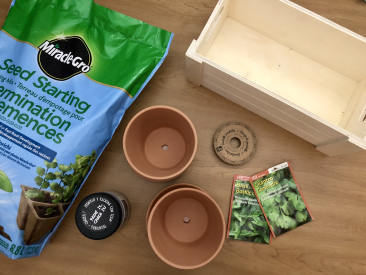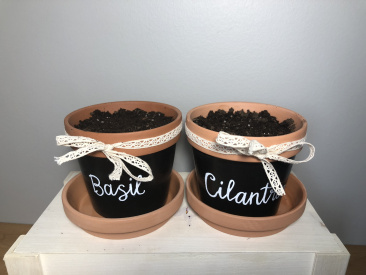
After looking through topics on how to disrupt climate change, I really liked the idea of gardening. When I was younger, I would often help my mom in the garden. I remember pulling out weeds, picking carrots, tomatoes, peppers, and apples, as well as growing tulips and marigolds. Although I grew up in the city, my mom still enjoyed and continues to enjoy gardening – and our home, both inside and out, were and still are always full of plants, fruit, and vegetables.
For this visual representation, I painted little clay pots with chalkboard paint, filled them with soil, and planted basil and cilantro seeds. I chose to use chalkboard paint so if I decide to transfer the plants, I will still be able to erase the name I wrote on the side of the pot to a different name. Because I live on residence, growing my own outdoor garden would be difficult, so I chose to stick with a small, indoor herb garden. Since it has been years since I helped in the garden, I feel a little overwhelmed and worried on how this project will turn out for me. I believe that if this does not work out for me and my plants do not grow, I can use this as a learning experience and try again. I also believe that if I enjoy doing this, I could start gardening with my mom again when I go back home in the summer.

In Robin Wall Kimmerer’s Maple Nation, she discusses reciprocity. When the term reciprocity is searched, the definition that comes up is “the practice of exchanging things with others for mutual benefit”. I believe that the important part to remember is “mutual benefit”, but unfortunately it is something humans seem to have forgotten. Moreover, the earth is giving us resources we need in order to live, but in return humans are destroying it. The following is a quote from the reading that resonated with me:
“If citizenship is a matter of shared beliefs, then I believe in the democracy of species. If citizenship means an oath of loyalty to a leader, then I choose the leader of the trees. If good citizens agree to uphold the laws of the nation, then I choose natural law, the law of reciprocity, of regeneration, of mutual flourishing.” (Kimmerer, 173)
One part of this quote that I really liked is the ending “I choose natural law, the law of reciprocity, of regeneration, of mutual flourishing”. Through this little herb garden of mine, not only will my plants be flourishing, I will be flourishing as well. Although I will be starting small, I will still be flourishing in terms of learning how to grow my own food, flourishing on how to take small steps in making a difference, and flourishing by finding ways to connect more with the earth and nature. My act of reciprocity as of now will be to care for these herbs. In the future, I hope to make my acts of reciprocity bigger by planting flowers outdoors for the bees, planting trees for more oxgen and to act as future homes for several species, and to grow my own produce to eliminate/lessen the use of industrial machines and toxins.
